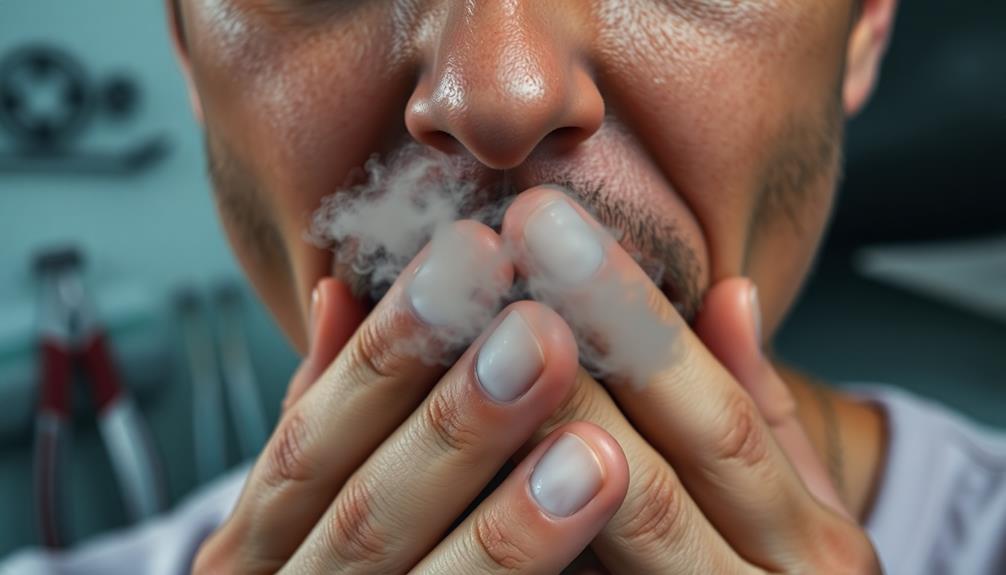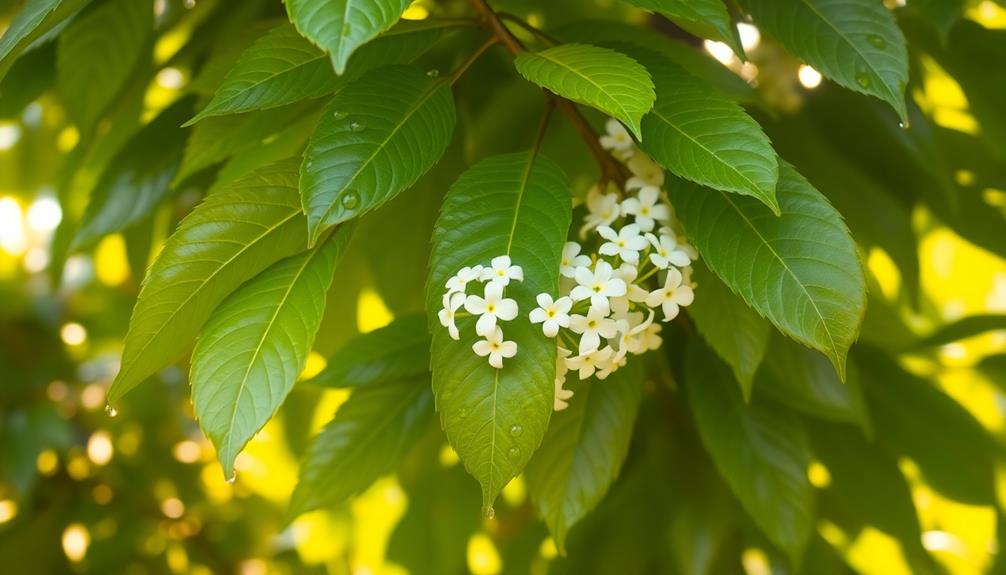Argan oil has a lovely light, nutty smell that can make you feel warm and happy. It's often compared to olive oil but can also have subtle fruity or sour notes. Depending on how it's made, you might find a stronger toasted scent if it's culinary-grade. High-quality argan oil smells fresh and inviting, while bad oil will smell sour. You might enjoy this scent when cooking or pampering yourself with beauty products. It brings a bit of Moroccan culture right to you! Stick around, and you'll discover even more exciting facts about this amazing oil.
Key Takeaways
- Argan oil has a light, nutty aroma similar to olive oil, often described as "liquid gold."
- Genuine argan oil may feature subtle sour and citrus notes, enhancing its fragrance profile.
- Culinary-grade argan oil offers a stronger, toasted nutty scent due to the roasting of nuts.
- High-quality oil retains a pleasant aroma; rancid oil emits a sour odor indicating spoilage.
- The scent evokes warmth and comfort, deeply connected to Moroccan culture and beauty rituals.
Introduction
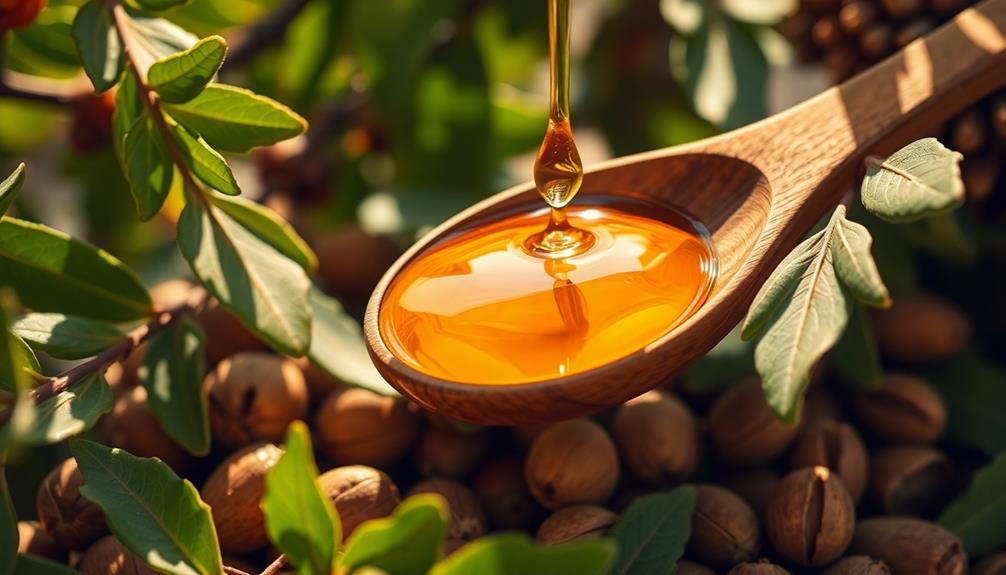
Argan oil, often hailed as a liquid gold, offers more than just nourishing benefits for your skin and hair; its aroma is equally intriguing. When you first encounter quality argan oil, you might notice its light, nutty aroma that wraps around you like a cozy blanket. It's a scent that can make you feel relaxed and happy. Naturally scented argan oil can also surprise you with subtle fruity undertones, making it even more delightful.
You'll find that the smell and texture of argan oil can vary. For instance, cold-pressed argan oil often has a slightly sour or citrus-like scent, while deodorized argan oil might have a sweeter, almost perfumed aroma. If you're lucky enough to have high-quality argan oil, you won't detect any rancid or unpleasant smells—those are signs of spoilage.
The aroma can change based on how the oil is processed and the conditions in which the argan nuts are harvested. Each bottle tells a story of its journey, inviting you to explore the wonderful world of this amazing oil.
Description of the Smell

When you open a bottle of authentic argan oil, you're greeted by its light, nutty aroma that's reminiscent of olive oil. This delightful smell hints at something natural and wholesome.
Genuine argan oil often carries subtle sour undertones, with a dash of citrus that makes it even more interesting. If you're lucky enough to try culinary-grade argan oil, you'll notice a stronger, toasted nutty scent. This happens because the nut kernels are roasted before oil extraction, giving it a richer aroma.
However, not all argan oil scents are created equal. Pure argan oil has a more robust smell, while cosmetic-grade oil might be less fragrant due to deodorization.
If you catch a whiff of rancid argan oil, don't be alarmed; that sour odor means it's spoiled. Also, a complete lack of scent could suggest dilution or lower quality, which isn't what you want.
Source and Composition
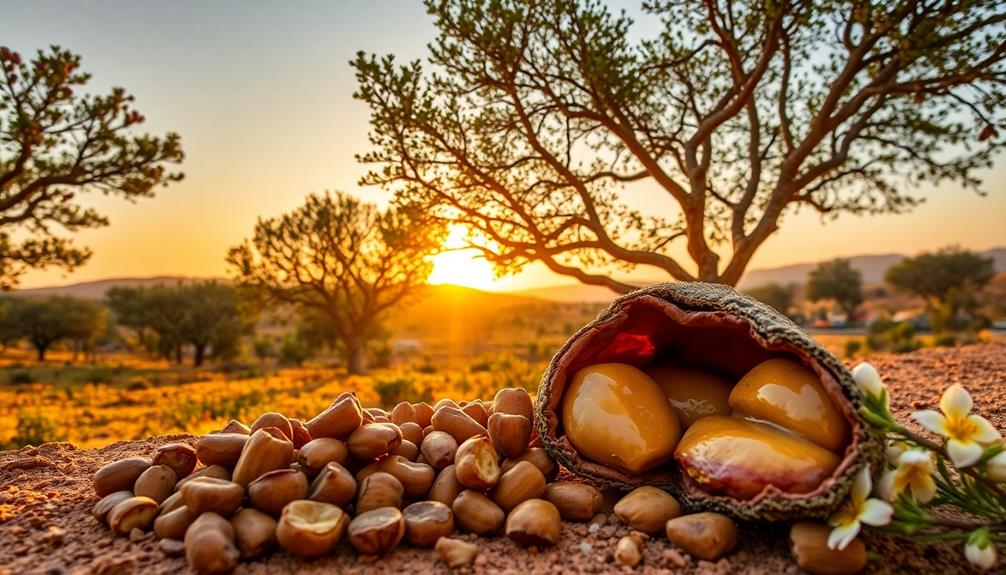
Sourced from the nuts of the argan tree, which thrives in Morocco's semi-arid climate, this oil is a product of both nature and careful processing.
Argan oil has a light, nutty aroma similar to olive oil. You might notice some variations, like sour or citrus notes, depending on how it's processed. The source of the nuts is important, as it affects the oil's smell and quality. Genuine argan oil has a pleasant, identifiable aroma, while fake or rancid oils can smell strong and unpleasant.
The composition of argan oil plays a big role too! Naturally scented argan oil keeps its raw fragrance, while deodorized versions go through treatments that change their scent. This results in a sweeter, perfumed aroma.
Culinary-grade argan oil, made from toasted nuts, has a robust nutty smell that sets it apart from cosmetic-grade oil, which is lighter and subtler.
Environmental factors, like soil and climate, also influence the final smell and natural properties of argan oil.
Typical Scenarios or Environments
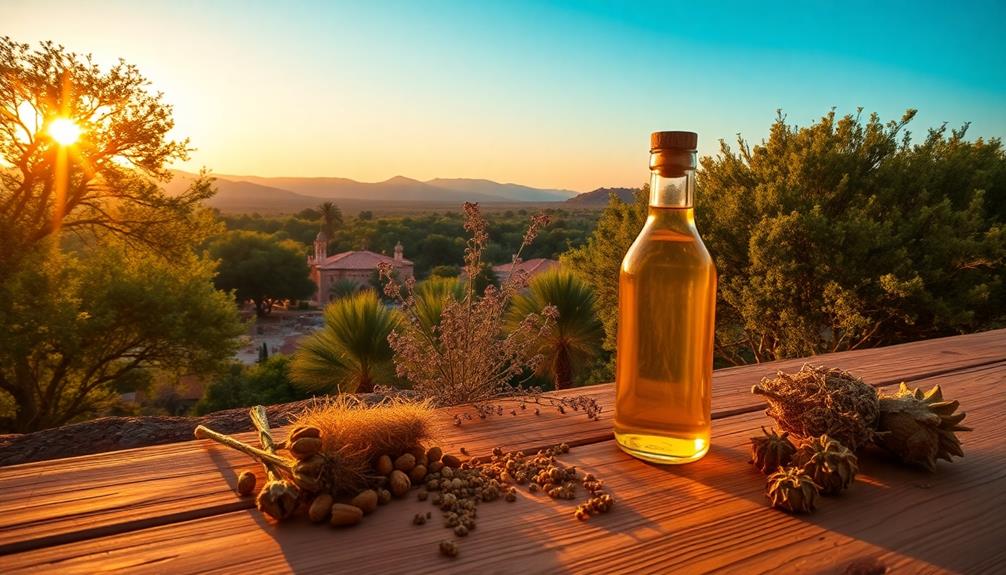
In various settings, the aroma of argan oil can create a distinct atmosphere, whether in a kitchen, spa, or beauty routine. When you're cooking with culinary-grade argan oil, the robust nutty scent fills your kitchen, reminding you of delicious flavors. You might even notice a light citrus hint, making every dish feel special!
In a spa, the scent of Cosmetic Argan Oil can be quite soothing. As you relax, the gentle, fruity aroma envelops you, helping you forget the day's worries. It's perfect for pampering your skin and hair, leaving them feeling soft and nourished. Plus, you can enjoy the benefits of its nutrient content, which makes your beauty routine feel more luxurious.
When you apply argan oil to your skin, you might catch that lovely, fresh scent that feels uplifting. The smell can vary, depending on how the oil was made or stored. If it's exposed to sunlight or air, it might lose some of its wonderful qualities.
No matter where you are, the unique smell of argan oil adds a special touch to your experiences!
Emotional or Cultural Associations
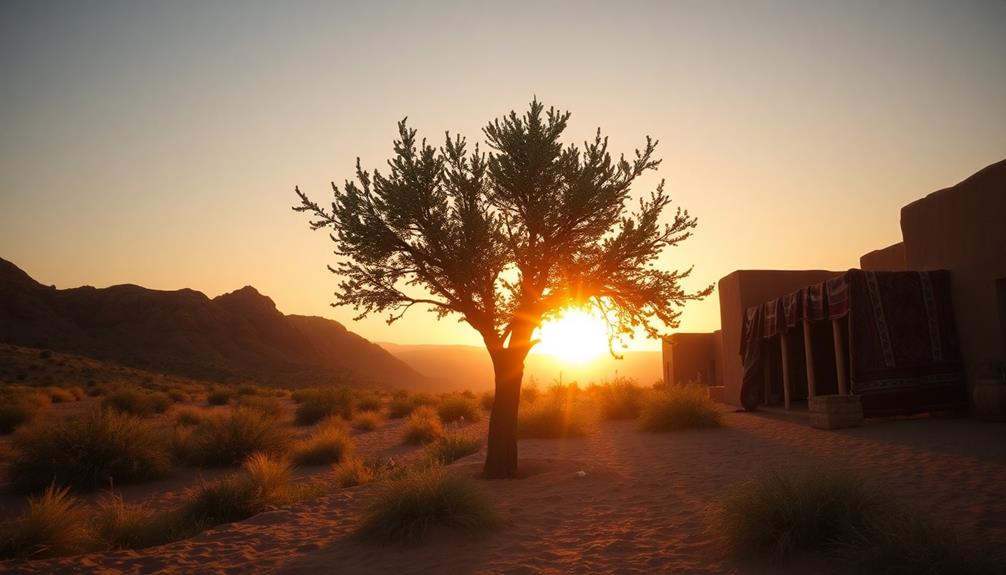
The aroma of argan oil often brings a sense of warmth and comfort, stirring up nostalgic feelings for many who connect it with its traditional roots in Moroccan culture. When you catch a whiff of its light nutty scent, you might feel relaxed and at ease. This is no surprise, as the argan oil smell is often linked to skin care and self-care routines that make you feel good.
In Morocco, the natural aroma of argan oil holds cultural significance. It's tied to communal gatherings and the preparation of traditional beauty rituals that have been passed down through generations. When you use argan oil, you're not just enjoying a luxurious product; you're also connecting to a rich heritage.
Many users report that this fragrant oil enhances their emotional responses during application, making every moment special. Plus, argan oil is often found in high-end beauty products and spa treatments, symbolizing luxury and self-care.
As you indulge in its delightful scent, you can appreciate how it links you to the beautiful landscapes of Morocco, bringing joy to your skin care experience!
Health or Safety Considerations
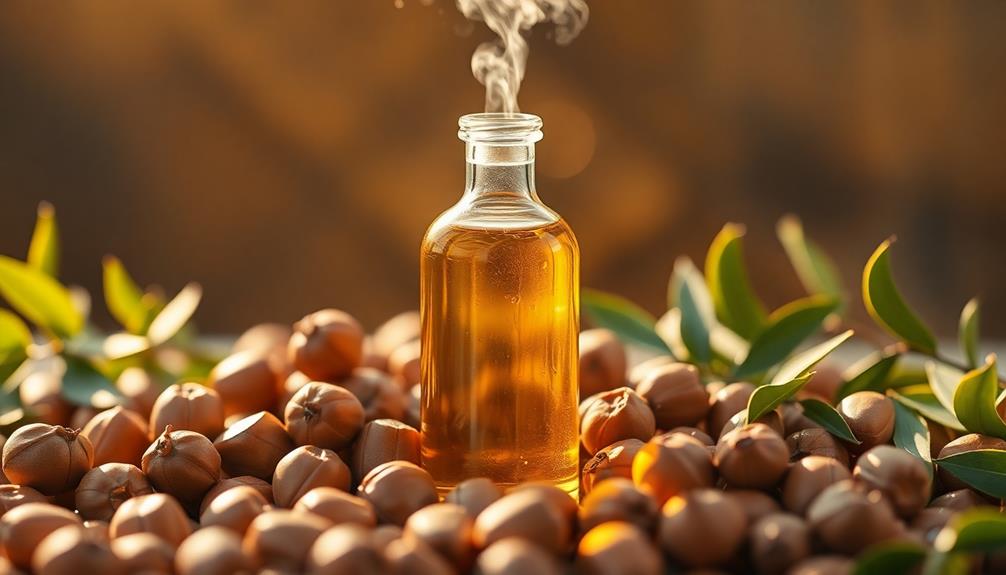
When considering the health and safety aspects of argan oil, it's essential to choose high-quality products to ensure you reap the benefits without any risks. The grade of argan oil can make a big difference. Look for hand-pressed oil, as it's usually fresher and has higher vitamin E levels. This vitamin is excellent for your skin, helping with various skin conditions.
Additionally, using products with glycolic acid can enhance skin texture and improve hydration, making your skincare routine even more effective benefits of glycolic acid.
If you smell a bit of a nutty or fruity scent, that's a good sign! But be cautious—if the oil smells sour, it might be rancid, indicating poor quality. Rancid oil can happen when it's not stored properly, like being exposed to sunlight or air.
Also, be aware that some argan oils go through mechanical filtration, which can change their smell. While deodorized versions may lack a strong aroma, you might miss out on some of the natural benefits. If you have sensitive skin, you might prefer naturally scented oil for its therapeutic effects.
Choosing the right argan oil ensures that you're using a product that's both effective and safe for your skin!
Final Thoughts
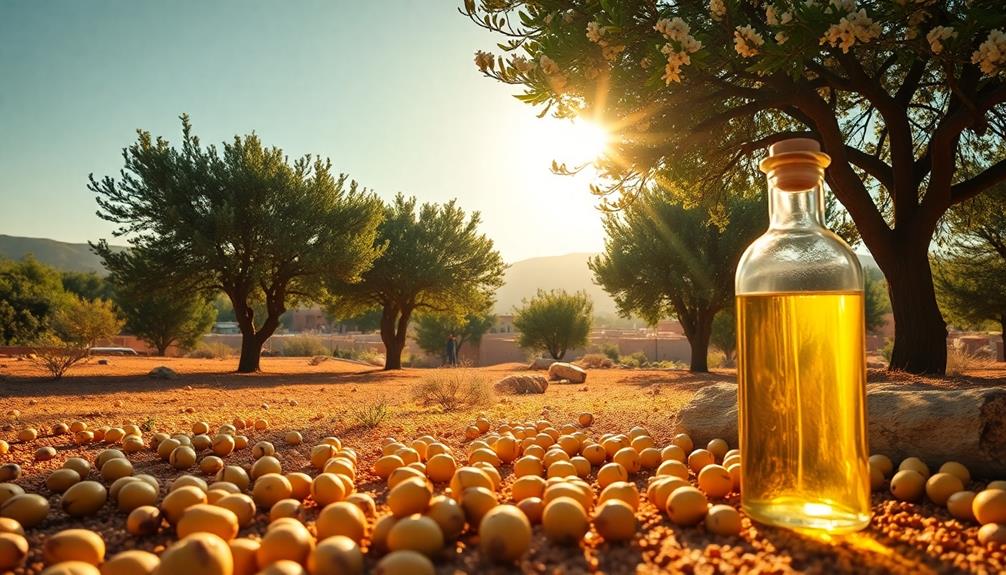
Ultimately, choosing the right argan oil can significantly enhance your skincare routine. This "liquid gold" is packed with benefits for both your skin and hair.
When picking argan oils, remember that the scent can tell you a lot about quality. A light, nutty aroma is a good sign, especially if it has hints of fruitiness. If you notice a sour smell, it might be rancid or spoiled, which means it's time to toss it out!
Store your argan oil properly to maintain its shelf life. Keep it away from high temperatures and sunlight. This helps prevent the oil from going bad.
Some argan oils are deodorized, making them nearly odorless, but they still deliver great results.
Also, look for argan oil that hasn't been mixed with inert active carbon powder or other fillers. Choose pure, high-quality options that will nourish your skin without harsh chemicals.
When you find the right argan oil, you'll truly enjoy the benefits it brings to your routine. Embrace the delightful scent and smooth texture, and watch your skin and hair thrive!
Frequently Asked Questions
What Is the Odour of Argan Oil?
When you explore the odor of argan oil, you'll notice it's often light and nutty. Depending on the type, it might smell fruity or even slightly sour, especially if it's been improperly stored. This distinct scent of argan oil can vary, but it’s generally mild and pleasant if the oil is fresh and unrefined. Interestingly, changes in body odor can sometimes provide crucial insights into health conditions. For instance, diabetesrelated body odor clues could manifest as unusual or sweet-smelling sweat, which may signal elevated blood sugar levels or poor glucose regulation. Similarly, when evaluating what oil typically smells like, it’s important to consider the quality, source, and whether it has been refined. Refined oils often lose their natural fragrance, while unrefined versions retain their characteristic scents, giving subtle hints about how they were processed. Ensuring proper storage and freshness is key to maintaining the pleasant aroma and benefits of oils like argan.
How to Tell if Argan Oil Is Real?
To tell if your Argan oil is real, check for a "100% Argan Oil" label. Genuine oil should be golden yellow, absorb quickly into your skin, and have a light, nutty aroma without any unpleasant smells.
Does Argan Oil Smell Rancid?
If argan oil smells rancid, it's likely spoiled. You should trust your nose; a sour odor signals degradation. Always check the oil's quality and expiration date to avoid using a compromised product.
How Would You Describe Argan Oil?
Argan oil's rich, nutty flavor enhances dishes beautifully. When you use it, you'll notice its smooth texture and versatility in cooking or skincare, making it a favorite for many health-conscious individuals like yourself.

